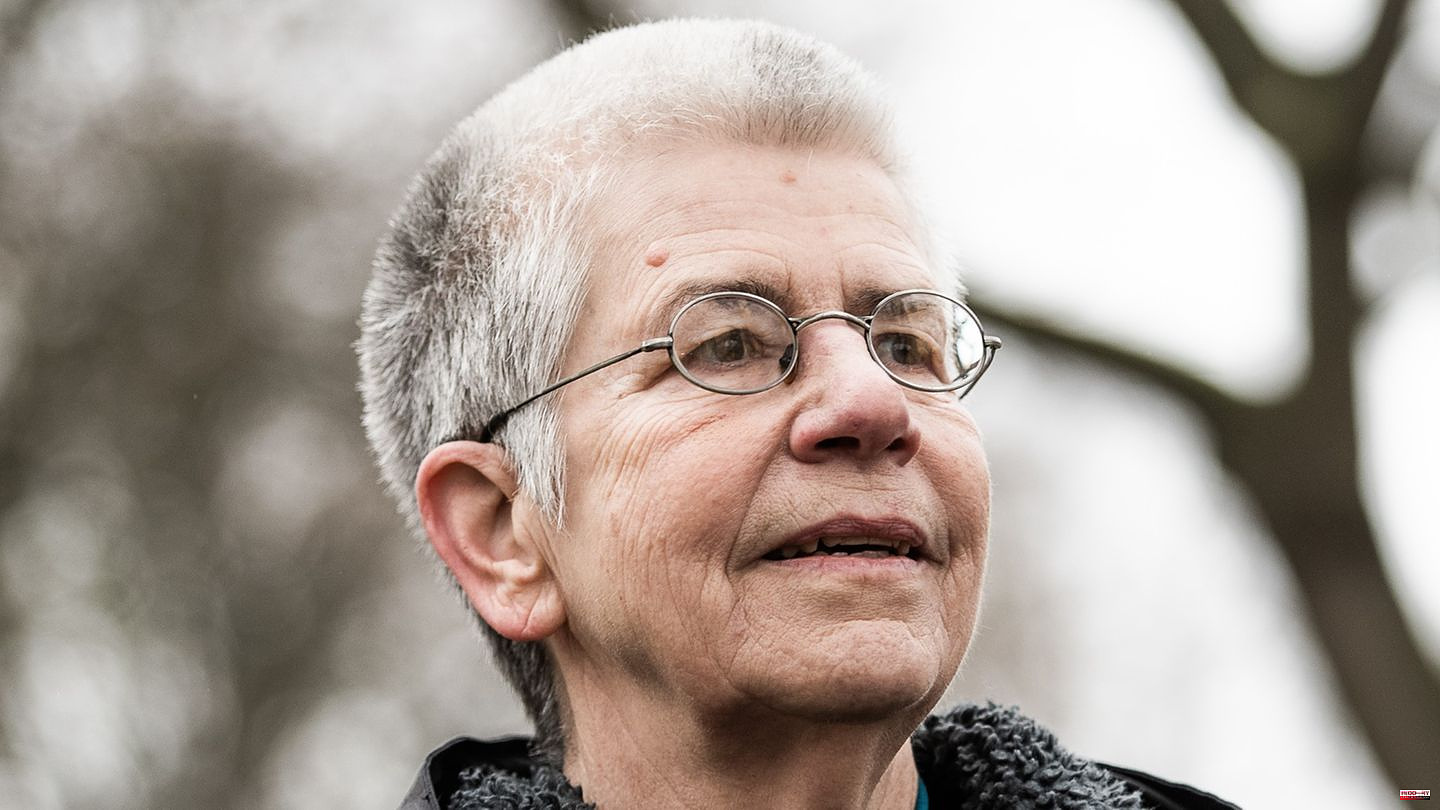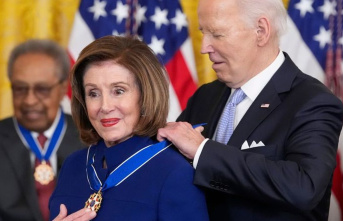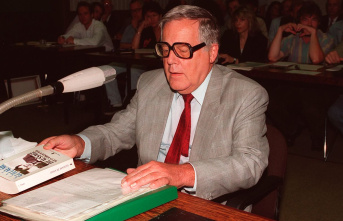Ms. Schilling, if you call your hotline, you will quickly have someone on the line to talk to. Is this something like telephone counseling - only specifically for older people? No, please not "like telephone counseling": the people there are better qualified than our volunteers. They have one year of training and specialize, for example, in the topic of suicide prevention. Our offer is “just talk.” Every person who broods alone has this need at some point, just needs someone to talk to. That's what we're here for, it's an extremely low-threshold offer.
But are there also similarities with telephone counseling? Of course. I used to be a telephone counselor myself, and what always touched me was the incredible closeness and depth that is possible in these conversations. My explanation is: This anonymity is a safe space in which I can talk about everything that concerns me and where I don't have to worry that someone will come along and want to interfere in my life. This protective space also exists at Silbernetz; our conversations are completely anonymous.
They only offer them to people over 60 years old. Are seniors lonely in a different way than younger people? As a young person, I always have a circle around me. As a pupil, apprentice, student or at work, there is always a circle of other people and opportunities to connect with me. Of course I can feel lonely even then, but that is a different kind of loneliness than that of older people. The more contemporaries in my personal environment die, the fewer people from my “team” still surround me and the more energy I have to use to get to know new people. And this at a time when this strength is actually dwindling. A crucial time is the transition to retirement. Many opportunities to get to know other people disappear and the children are usually far away. At the same time, my friends and acquaintances often leave me alone, and possibly my partner too.
How did you come up with the idea of founding Silbernetz? There was a key experience. In my first apartment in Berlin I had an older neighbor who helped me assemble furniture when I moved in. He used to be a caretaker. We greeted each other friendly in the stairwell, his balcony adjoined mine, but I knew little about him. In 2012, two years after I moved in, I noticed that he was withdrawing, he just stopped appearing, his children stopped coming to visit.
Did you respond to that?Once I rang his doorbell, he answered it too, and I said: "Hello, Mr. Neighbor, I just wanted you to know, I'm here. You helped me, I can help you if ever what is." He said: "Thanks, I don't need anything, everything is fine."
But the story continues...At one point there was a flyer on his door for two weeks, and a lamp burned constantly in his living room. I had my suspicions and informed the police, but they wouldn't open the door. Only when these blue-black flies appeared in my apartment did they take action. I watched the body bag being taken away; the apartment was being renovated for months. In fact, that was the trigger for me to start intensively researching what help was available for older people. I don't think anyone should be so lonely.
But there are a lot of things. The large welfare associations...Exactly, I first wanted to get to know the perspectives of the specialist staff from various initiatives and welfare associations that offer help with loneliness. So I organized a workshop. I heard from everyone: Well, many people simply don't want any more contact. When I hear something like that, the hairs on the back of my neck stand up. Behind this lies the sheer helplessness of the helpers.
How did you come up with the idea that the telephone could be a way to reach the lonely? I owe the first idea to a crime novel by Minette Walters called "The Neighbor". In this, a telephone chain is a basic building block of the plot. It was initiated by a community sister who noticed the loneliness of many old people in a council estate and, with their consent, gave the telephone numbers to others who were also lonely. I wrote to Minette Walters and asked how exactly this was organized. She wrote back that in reality there were no such local telephone chains and that she had come up with it for the crime thriller.
It would be a nice idea. But is there another role model from abroad? Oh yes. The nationwide Silver Line Helpline in London. I went there in spring 2014 and my colleagues told me very openly what they were doing and even gave me their documents for the courses that train volunteers. So I had a lot of material on the table and was able to find allies to build Silvernet. I soon found them, we were a group of eight interested people, including some doctors, a nurse, a journalist. At first we encountered great resistance.
Why this? Surely there was a big gap in the supply? That no one saw. In the "German Aging Survey", for which older people are asked about their living conditions every few years, the "second half of life" was defined as the age between 40 and 80 years. Beyond 80 there was nothing. The answer I actually received from the German Center for Aging Issues, which carries out this survey, was: "The loneliness of older people is declining in Germany." Then the hairs on the back of my neck stood up again. I am a mathematician and worked as a statistician in the GDR. Such blanket statements, based on statistics that exclude entire sections of the population, are very difficult. In 2014 we encountered a sheer refusal to address this important topic. So we first had to alert politicians and scientists that something was happening - and at the same time build our structures.
And did you manage to do that? Initially through “startsocial”, an association under the patronage of the Federal Chancellor that advises social initiatives. With their help, we sharpened our concept and drew up a budget. We founded ourselves as an association and also found a sponsor. It wasn't the welfare associations that declined; they seemed overwhelmed in terms of content and structure. For three years we came under the umbrella of the Humanist Association, for which I am still grateful today. He managed the donations that went to us.
And then you started the hotline right away? Yes. But time was short. There were still six weeks until the loneliest phase of the year, Christmas. Until then, we wanted to get a “holiday phone” up and running – initially just as a demonstration example. So we organized a press conference and shot a video for the online presence, and we also started an online petition to the ministries demanding that they finally provide valid figures on loneliness among older people. And then between Christmas and New Year we sat on two phones in the office and took calls around the clock. There were more than 400 phone calls, at that time only from the Berlin area. There were many touching stories that the media then became interested in. This is how we became better known. The regular hotline only started nine months later, and today we can be reached nationwide.
So how many people have called in total since fall 2018? For our five-year anniversary we calculated: By then there had been around 500,000 calls. The silver telephone currently rings around 3,000 times a week, and there are between five and 65 first-time callers every day.
How do you cope with this onslaught? We have been standing on our own two feet for almost four years and, in addition to donations, we also receive partial funding from the Berlin Senate Administration. We are now a social enterprise with almost 40 employees and 300 volunteers and are growing by almost 20 percent every year.
Who are these volunteers and how do they come to you? They are between the ages of 20 and 85 and have very different backgrounds, but what they have in common is an unreserved interest in older people. They don't have these prejudices that old people always want to talk about illnesses, are weak or stubborn. And I get feedback that their image of age is changing significantly as a result of this voluntary work. Old people are in fact the population group with the greatest diversity, they are people with a lot of life and professional experience, they tell you endless emotional stories that have accumulated over their long lives.
Now I almost feel like becoming a volunteer for you myself...Go ahead, welcome (laughs)
In addition to the hotline, where you can always call as an old person, there is the “silver network friendships”. How can those interested apply? You can register via our homepage under the heading “Become a Silver Network Friend” and then complete a short training course, twice for six hours on certain weekends. Above all, they learn conversation strategies: How do I start my first conversation with a total stranger? What do I do when I have someone on my turn who starts chatting straight away so that I don't get in the way? Or how do I get someone to talk who can't get out of themselves? What do I show about myself in these conversations so that an exchange actually takes place? There are training courses for such questions. The volunteers then receive their contract as a silver network friend.
How exactly does matching with callers work? Can you indicate special areas of interest and preferences - so that you then have something to talk about? In the initial conversation via the hotline, our volunteers and permanent employees record the most important data from our callers. They go on to a colleague who does the matching. She calls the old people back and asks about their interests. And then, for example, she finds out that Ms. Meier would like a gentleman about her age who, like her, likes to go for walks, loves his garden or reads books. And then she looks in the file to see if there is a suitable silver net friend, we know them all the training.
And then the silver network friends call the interested parties?… and usually agree on a fixed time every week at which they will then make phone calls in the future. But always anonymously, which means that both sides don't get each other's phone numbers.
Hardly anyone in Germany combines as much theoretical and practical knowledge about loneliness in old age as Elke Schilling. In this book, the former State Secretary, who is experienced in politics, outlines solutions and ways in which we can counteract loneliness in old age and individually. She also lets those who are at stake have their say - old people who have answered the silver telephone. Enriched with such original tones and many anecdotes, her book makes loneliness tangible even for those who are lucky enough not to be affected themselves.
Do real friendships develop from this, where both parties exchange phone numbers and maybe even meet up? We always say: we are dealing with adults, on both sides. And if they decide to give up their anonymity, then they take responsibility for the relationship and we withdraw. And that happens, of course. For example, I am thinking of a Silbernetz friend here in Berlin who was introduced to an old lady in Passau. After nine months, this friend wrote to me: we have decided to go private, I am going to visit my friend in Passau.
You yourself are approaching 80. Is loneliness an experience that affects you more and more? Not now. But there was a phase in my life in which I really experienced loneliness very intensely. After reunification, I was State Secretary for Women's Policy in Saxony-Anhalt until 1998. I was just 54 years old then. I didn't think I was old, but I was no longer needed on the job market. And then I became self-employed as a freelance consultant on the topic of gender mainstreaming. So I was new to self-employment with an unpopular topic. And then I sat at my desk and thought: Okay. That's what I need for my daily living and that's how much I earn, it doesn't add up. There were already big cliffs there. And when you have to deal with it alone, and I lived alone at the time, it makes you very lonely.
Do you now have a life partner again? I separated peacefully from the last one and never saw him again. No, I live wonderfully alone and enjoy it.












